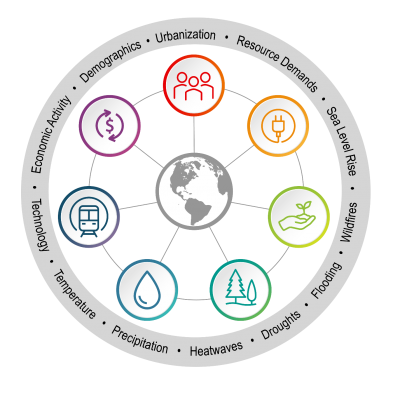Global Change Intersectoral Modeling System (GCIMS) Scientific Focus Area
Project Team
Principal Investigator
Project Participant
Task Lead
The Global Change Intersectoral Modeling System (GCIMS) scientific focus area aims to improve the understanding of the complex interactions among energy, water, land, climate, and socioeconomics systems. GCIMS focuses on regional to global and seasonal to centennial scales. In addition to advancing our scientific understanding, GCIMS emphasizes developing and applying an internally consistent, open-source, and computationally efficient modeling framework. This framework captures the evolution of the integrated human-earth system. The GCIMS team seeks to simultaneously resolve the effects of:
- Compounding short- and long-term influences on energy, water, land, climate, and socioeconomic systems over the next 10 to 100 years;
- The responses of these systems to those influences; and
- Feedbacks that fundamentally alter the frequency or intensity of influences.
This SFA has also supported the development and use of the Global Change Analysis Model (GCAM), the world’s premier open-source integrated human-Earth model since its inception more than three decades ago. GCAM has made critical contributions to our understanding of how energy technologies, land-use practices, and other human activities influence Earth system dynamics. It has been the foundation for developing plausible future scenarios used in science-based environmental and energy analyses.
The complexity of GCAM has evolved commensurate with scientific questions about how human and Earth systems interact. In particular, the GCIMS team’s focus has shifted from studying the interactions of a limited number of systems (energy-economy-climate) at a highly-aggregated level to consideration of multiple interactions (energy-water-land-economy-climate) at greater temporal, spatial, and process resolution, though still in a global context.

